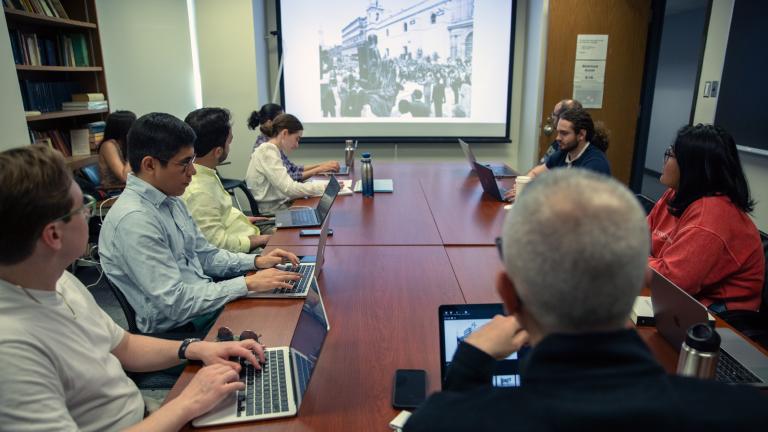Doctoral Program
Program Overview
- Twenty course units (students who enter the program with previous graduate work may be eligible to transfer some credits toward the Ph.D.)
- Fulfillment of two language requirements
- Four semesters of undergraduate teaching, one course per semester
- A qualifying evaluation
- A comprehensive examination—oral and written
- A dissertation based on original research in the area of concentration and its defense
Admissions and Financial Support
Candidates for admission should have an excellent command of Spanish, a superlative undergraduate record, strong letters of recommendation, and demonstrated skill in academic writing. Applications are accepted only for full-time work in the Ph.D. program beginning in the fall semester. All students admitted to the program receive a five-year Benjamin Franklin Fellowship that includes a stipend, tuition remission, and student health insurance. Students who have finished all pre-dissertation requirements and who no longer receive fellowship support are eligible for a lectureship.
Opportunities for Interdisciplinary Study
Students may complement their studies with up to five courses outside the Spanish and Portuguese section. For example, students may take courses in another Romance language, Comparative Literature, English, or History. Certificate programs are also available in the areas of Women's Studies and Urban Studies. The University of Pennsylvania enjoys reciprocal agreements with several other nearby institutions, which allow students to complete a number of courses in them while enrolled in a graduate program at Penn. Additionally, interdisciplinary study is encouraged through participation in the wide range of seminars, lectures, and colloquia sponsored by the various Graduate Groups and affiliated research institutes and centers at Penn, including the Center for Italian Studies and the Latin American and Latino Studies Program. The Penn Humanities Forum also provides a forum for doctoral students to interact with colleagues from across the disciplines and holds weekly meetings as well as special research seminars, colloquia, and an annual student conference.
Placement
The Department offers guided preparation for students' participation in the academic job market. Students receive advice and feedback on their job application materials (CVs, cover letters, teaching statements, research statements, etc.) and attend an intensive one-day seminar in December that prepares them for the Annual Convention of the MLA. Mock interviews and practice job talks are also arranged. Recent graduates of our program have fared extremely well on the job market, accepting tenure-track positions at some of the best colleges and universities around the country.
The Career Services Office makes every effort to assist students in finding employment and offers a range of services geared toward both academic and nonacademic career options.
Library Resources
Van Pelt Library, the University's central humanities research collection, is especially rich in the Romance languages areas, with outstanding collections of rare books and manuscripts. The Spanish literature collections, while strong in all areas, have historically been most outstanding in the areas of Medieval and Golden Age literature and include the Rennert Collection in Spanish Golden Age drama. In addition, there are significant collections in other languages and literatures of the Iberian Peninsula: Portuguese, Galician, and Catalan. The Latin American collections include a number of extraordinary special collections, and current collecting reflects the vigorous state of Latin American scholarship on campus.
The Hispanic Review
The Department publishes the prestigious literary journal the Hispanic Review. Each year, a number of graduate students in Spanish have the opportunity to work as assistant editors.
Hispanic Studies Graduate Student Group
The Hispanic Studies Graduate Student Group, the graduate student organization of the Spanish and Portuguese Department, works to enhance the general welfare of graduate students in both intellectual and practical terms. This group helps to organize Department-sponsored lectures and colloquia, organizes an annual graduate student colloquium, and publishes a journal of its proceedings.
The Gregory House Modern Language Program
Graduate students have the opportunity to live and work as resident advisors at the Gregory House, an undergraduate campus dormitory that is staffed by native speakers, graduate students, and faculty members from participating departments in French, Spanish, Italian, and German. In addition to communal dining for House residents, each floor offers weekly coffee hours for informal conversation, movies, and other social events.
Department Facilities
The Department of Spanish and Portuguese occupies the fourth and fifth floors of Williams Hall, with a seminar room for Romance Languages graduate classes, a graduate lounge, and a computer lab, as well as the Cherpack Lounge, where faculty and graduate students meet informally, and where lectures and colloquia sponsored by the Department are held.
Contact Information
Laura Flippin
Graduate Coordinator
University of Pennsylvania
514 Williams Hall
Philadelphia, PA 19104-6305
Telephone: (215) 898-1980
Fax: (215) 898-0933

